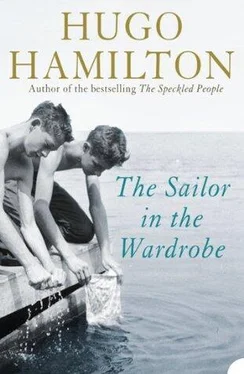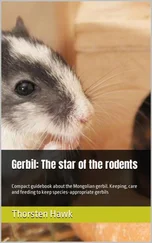My father says it’s unfair to accuse the Irish of things that never happened. But when it was clear that the Nazis were not coming to Ireland to solve the Northern problem, Gearóid began to talk about mobilizing. In desperation, he began moving the party towards the physical force ideology. And at that moment, there was a crisis in the movement. My father and some of the other senior members of the party organized a putsch. Gearóid’s leadership was brought into question, because they didn’t want to go along with an armed struggle. They still believed in a peaceful, non-violent, cultural movement, based on persuasion and openness. They became uneasy when they heard the reports of hobnail wars.
It was mostly the people from Cork who initiated this putsch, calling for a meeting in which they would announce that they had lost confidence in Gearóid as a leader. Was it a party of physical force or cultural persuasion, they demanded to know. They could not be both. It was either hobnail boots or poetry, violence or creativity. The Cork faction knew how creative violence and resentment could be, but they didn’t want it.
When Gearóid got news of the impending putsch, he didn’t wait for them to call a general meeting and expelled all the doubters from the party before they got a chance to speak. He went around to all the people who had planned the putsch and individually accused them of betrayal. He struck them off the register and said they were non-members. They had gone soft, he announced in a speech to an assembly from which they were now barred. The betrayers had become like all the other Irish people, unable to see the vision, unable to obey. But that only made matters worse and eventually the entire Cork membership resigned from the party and stopped paying their contributions.
I know what it was like for my father to lose his best friend. Gearóid would not speak to him any more. It must have been like the time that Packer froze me out, a time of great emptiness. He must have felt like he was drowning, or suffocating, walking around Dublin with his briefcase like an invisible man and his best friend walking past him in the street.
After that, the Aiseirí movement fell apart. Things had moved on and De Valera was saying all the things about Northern Ireland that the Irish wanted to hear. There was no need for Aiseirí any more and people drifted away into other parties. My father still had lots of energy left for Ireland. He still wanted Ireland to have lots of new inventions. So one day he went to see Gearóid and asked him to be friends again. It was like the moment when I went into hospital to see Packer after his motorcycle accident and we put the silence behind us. My father could not bear to be outside in the cold any longer and when he was assured that Gearóid would put aside any physical force, he was happy to rejoin the party.
So that’s how the party came to an end, with the two of them, Gearóid and my father, as the last remaining members. Gearóid still went on publishing his paper and my father wrote for him. They kept having meetings in empty, unheated rooms on Harcourt Street and my father took down the minutes, even though it was only the two of them left under the naked light bulb. They continued to make speeches, but they had become an insignificant movement.
My second name is Gearóid, which means that I was called after the leader of the Aiseirí Party. Maybe it was lucky for Ireland that they never came to power. But as the party fizzled out, my father and Gearóid both decided to take the struggle inside, into their homes. What they could not achieve politically, they would achieve inside the family instead, where they could create the perfect republic with strong leadership. Gearóid got married and had lots of children. When my mother came over to Ireland from Germany and met my father, he got married too, and started the German-Irish family. The language war went indoors. Gearóid and my father did their best to outdo each other. They taught their children how to make sacrifices for Ireland. My father started with his eldest son, Franz, and broke his nose one day for bringing English into the home. Gearóid did the same with his eldest son, who once had an abscess in one of his teeth, but because the dentist could not speak Irish, he took him home again and left him in pain.
My mother began to change my father and he no longer believes a lot of the things he believed in then. Sometimes he speaks to me and says he made mistakes. He wants me to forgive him and not to make the same mistakes. He wants to make sure I don’t go up to the North of Ireland and join the IRA, because that would mean that our family had learned nothing, either from Irish history or from German history. He wants me to remember that he was against physical force, and even though he lost his temper sometimes out of frustration and idealism, everything he did was for us and for his country. He embraces me and I feel suffocated by the feeling he has for me. He says I’m going to correct all his mistakes. Because that’s what fathers are for, so that sons can start again and make different mistakes.
I find it hard to talk to him, and it’s hard to be friends with him, but when he smiles and goes back down the stairs into the front room, I can only think about all the things he made for us, the wooden toys, the trips he made with us, down to Connemara and over to Germany. I think of all the walks we went on and the camera he once bought for me on my birthday. It wasn’t a real camera, but I kept taking photographs when we went down to the seafront. I clicked my camera and the photographs stayed in my head, photographs of my mother smiling and pointing out at the washing line of yachts in the bay, of my father with his hand up to shield his eyes from the sun, of the sea and the dog that barks at the waves, of people walking along with ice cream cones. We came across the ice cream van parked by the side of the road with the name Mister Softie. My mother bought us all an ice cream cone with a drop of red jam in it and I took a photograph of Mister Softie inside his van. The engine was running all the time to keep the refrigerator going, so we could smell the ice cream and the seaweed and the puff of diesel fumes, all at the same time. It was a hot day and everybody was wearing summer clothes and trying to keep themselves cool. We even saw a Garda patrol car parked nearby with the windows open and two uniformed Gardai inside with their hats off, eating ice cream cones as well. They smiled when I took a photograph of them. Then my mother and father were laughing at the sea again, and I will never lose those photographs because they were made with a toy camera.
There is still no news from Stefan. No postcards, no message, no sighting in public. Tante Käthe has arrived in our house with shadows around her eyes, as if she’s been crying all the way over from Germany. She has come to see the country where her son has gone missing. My mother talks to her in the front room, trying to convince her that Ireland is not such a fierce place as you might think, that the mountains are soft and the people are soft and that Stefan is so overwhelmed by the landscape that he’s just forgotten to write home. But Tante Käthe looks at the rocks, the waves, the wide blue bay and the mountains behind the city, and to her they are all things that prevent Stefan from coming back home.
I am an optimist like my mother, so I keep thinking of Stefan alive, walking through the fields in the West of Ireland, kicking a tuft of grass into the air and scoring a goal between two gorse bushes, following a cattle trail and stepping through the gaps in the stone walls. Stefan, the inward man, on the run from his father, inventing a new identity for himself so that he will be given refuge. I call him the Playboy of the Western World, because he’s made up a story for himself, a story where he can go underground and disappear. I know he’s come to the big Irish mirror, the sight of the Atlantic ocean, where everybody sees their own reflection.
Читать дальше
Конец ознакомительного отрывка
Купить книгу












